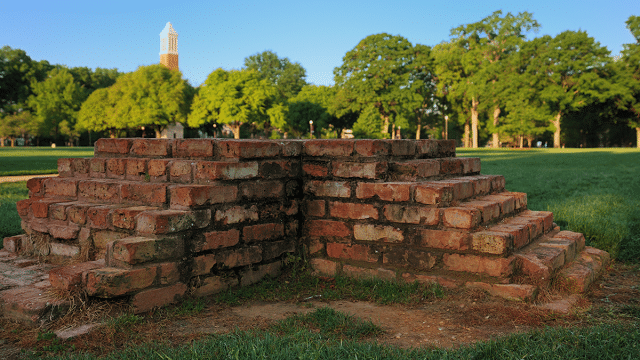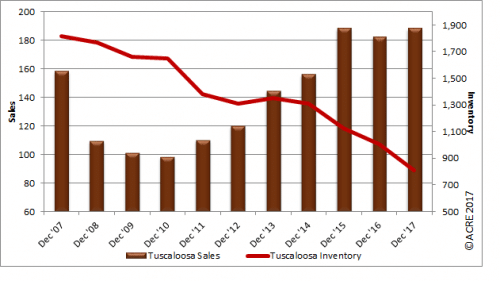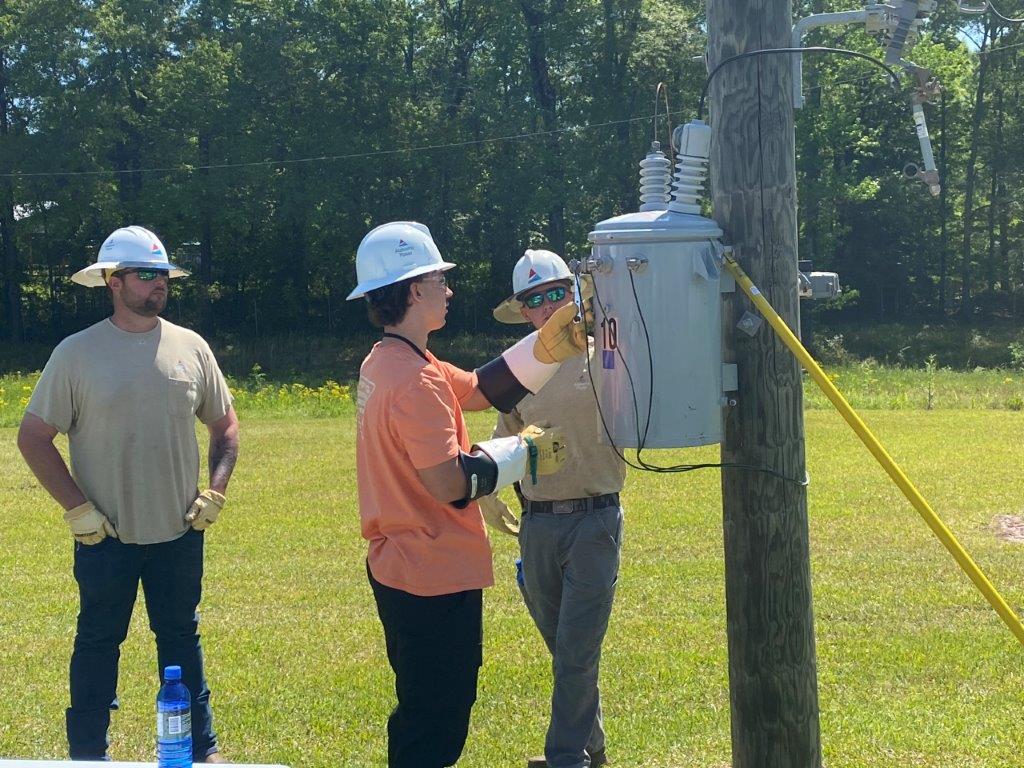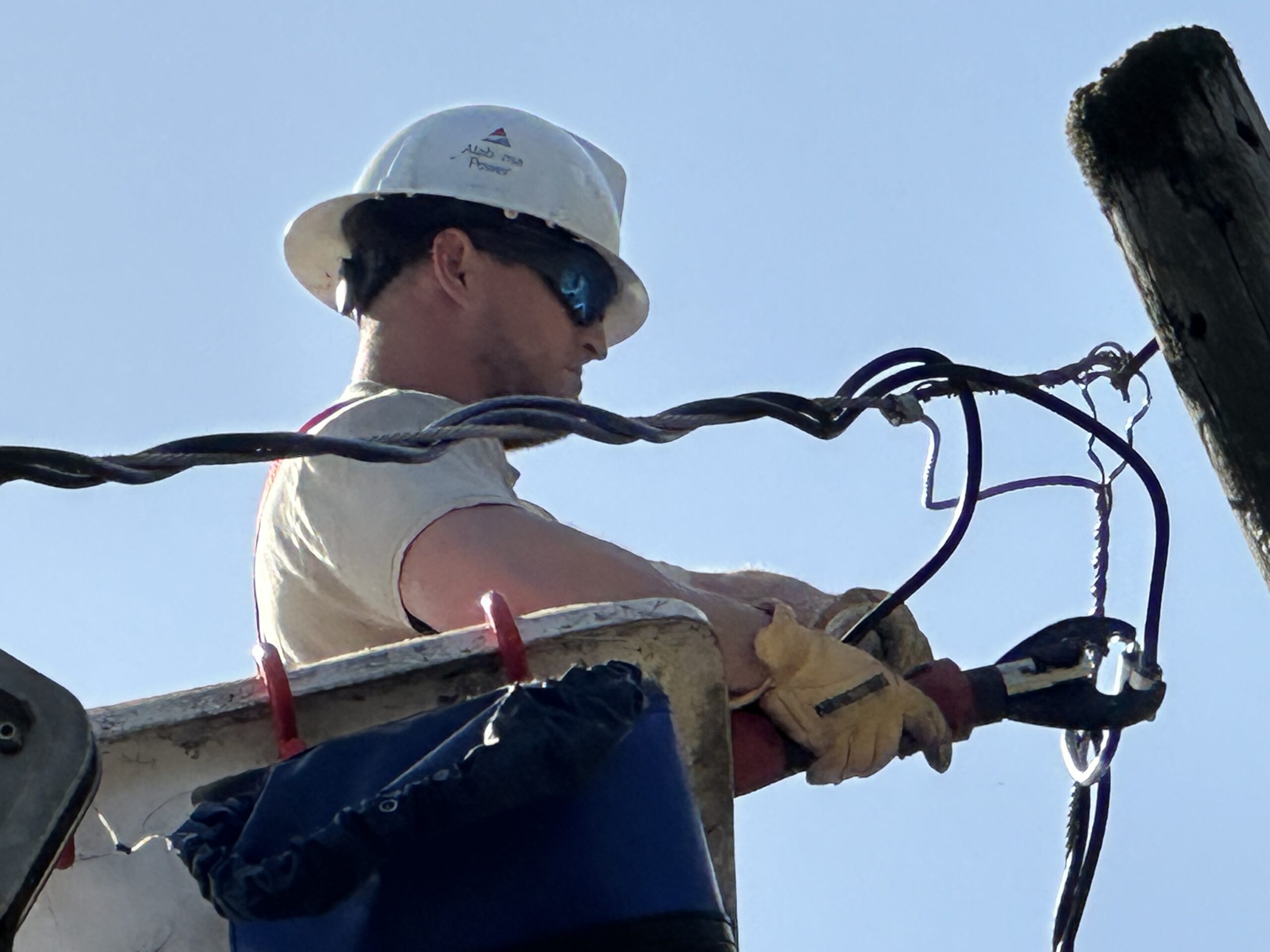Tuscaloosa’s December home sales increase 3.3 percent from 2016

Tuscaloosa homes are selling much more quickly than in prior years. (Getty Images)
Click here to view or print the entire monthly report compliments of the ACRE Corporate Cabinet.
Sales: According to the Tuscaloosa MLS, Tuscaloosa-area residential sales totaled 188 units during December, up 3.3 percent from 182 homes sold during December 2016. Sales for all of 2017 were up 5.4 percent from 2016. Two more resources to review: Quarterly Report and Annual Report.
For all of the Tuscaloosa area’s housing data, click here.
Forecast: December results were seven units or 3.9 percent above the Alabama Center for Real Estate’s monthly forecast. ACRE’s 2017 sales forecast through December projected 2,539 closed transactions, while the actual sales were 2,590 units.
Supply: Tuscaloosa’s December housing inventory totaled 811 units, a decrease of 19.5 percent from December 2016. December inventory dropped 8.7 percent from November. Inventory has now declined 55.3 percent from the December peak (1,813 units) reached in 2007.
Seeking balance: For the month of December, the inventory-to-sales ratio declined 22.1 percent from 2016 to 2017. It now stands at 4.3 months. Restated, at the December sales pace, it would take 4.3 months to absorb the current inventory for sale. The market equilibrium (balance between supply and demand on a non-seasonally adjusted basis) is considered to be approximately 6 months.
 Demand: December residential sales were 2.1 percent below the prior month. Historical data indicate that December sales on average (’12-’16) decrease from November by 16 percent. Existing single-family homes were 74 percent of total December sales. New construction sales were 16 percent and condo sales were 10 percent. Tuscaloosa homes selling in December averaged 75 days on the market, a decrease of 15.7 percent from 2016, as the five-year average for days on the market for December home sales is 116 days.
Demand: December residential sales were 2.1 percent below the prior month. Historical data indicate that December sales on average (’12-’16) decrease from November by 16 percent. Existing single-family homes were 74 percent of total December sales. New construction sales were 16 percent and condo sales were 10 percent. Tuscaloosa homes selling in December averaged 75 days on the market, a decrease of 15.7 percent from 2016, as the five-year average for days on the market for December home sales is 116 days.
Pricing: The Tuscaloosa median sales price in December was $167,200, a decrease of 1.8 percent compared to December 2016. The median sales price was down 0.4 percent from November’s median price. Historical data (2012-16) indicate that the median sales price in December typically increases from November by 5.4 percent. It should be noted that differing sample size (number of residential sales of comparative months) can contribute to statistical volatility, including pricing. Consult with a real estate professional to discuss pricing, as it will vary from neighborhood to neighborhood.
Industry perspective: “(Last year) ushered in with an outlook of uncertainty on the heels of the 2016 national elections, but 2017 went out with an exclamation punctuation mark of growth,” said KC Conway, director of research and corporate engagement at the Alabama Center for Real Estate (ACRE). Conway said 2017 “was the year we have waited a decade for since the onset of the 2006-2007 housing crisis. U.S. GDP turned in back-to-back quarters of more than 3 percent growth in Quarter 2 and Quarter 3; and 2017 will be the first year in a decade that the U.S. turned in an annual GDP growth rate north of 2 percent. It was just 1.7 percent in 2016. (The new year) will see 2.5 to 3 percent GDP growth.
“Employment growth is a good-news story as well. The ADP National Employment Report is this economist’s go-to monthly jobs report as it is based on rich primary data – not a survey, as in the case of BLS jobs report. The January ADP report revealed more than 250,000 jobs created in the month of December (compared with 148,000 in the BLS year-end jobs report). ADP job growth for the trailing three months (more than 224,000 jobs), six months (more than 199,000 jobs), and 12 months (more than 212,000 jobs) were all at or above 200,000 jobs per month. This trend should continue through 2018.
“Heading into 2018, the more important questions to answer for Alabama Realtors are:
- What do the real estate metrics look like?
- Will home builders finally be confident enough to start more inventory?
- Will the FED ruin the good times with more rate hikes in 2018?
“With respect to the real estate market conditions and home-builder confidence, the National Association of Home Builders (NAHB) Housing Market Index (HMI) is your best barometer of things to come. The HMI is a monthly survey of NAHB members to take their pulse on the single-family housing market and rate conditions for the sale of new homes over the coming six months. In December 2017, the HMI registered 74 — the second-best reading since 1985 and best since December 1998. A reading above 50 reflects growth. The December 2017 reading of 74 compares to a record low of just 8 in January 2010. We have come a long way since 2009-2010.
“With respect to home-building activity in Alabama during 2018, some perspective on 2017 is fruitful. In 2017, Alabama issued 13,200 permits in the January to November period – of which 11,200 were for single-family residences and 2,000 multifamily units. Breaking down the Alabama permit activity, Huntsville has overtaken Birmingham for the most total housing permits with 2,804 (2,422 single family versus 382 multifamily). The top five metropolitan statistical areas for housing permit activity during 2017 through November were:
- Huntsville with 2,804 total permits.
- Birmingham with 2,746 permits.
- Daphne-Foley with 1,699 total permits.
- Auburn with 1,292 total housing permits.
- Tuscaloosa with 976 total new permits.
“Finally, will the FED ruin the good times with too many rate hikes? In short, the answer is no. However, the FED is worth watching in 2018 as it is a new cast of characters led by a new chairman (Chairman Jerome Powell has yet to be confirmed by the Senate but is expected to take over in February or March from existing Chair Janet Yellen). The FED is not likely to depart from rate hikes in 2018 (expect three, maybe four, starting in March due to higher GDP and tighter labor markets). Communicate now with your prospective spring home buyers as the 10-Year Treasury is rising. It is already threatening a 2.6 percent level. Thirty-year mortgage rates will climb above 4 percent in 2018. New home builders can manage rate increases by curtailing amenities in the new home to buy-down the mortgage rate to 4 percent or below. New home activity will not be impacted, but existing home listings will have a disadvantage unless sellers are willing to contribute toward points to also buy down the rate. Dust off your playbook as to how this works so you don’t lose a sale in 2018. Home-price appreciation is strong and ran above 6 percent in 2017. It will remain strong (above 5 percent) in 2018 despite signs that more inventory is going to be put in the ground during the spring 2018 months.”
Click here to generate more graphs from the Tuscaloosa December Housing Report, including Total Sales, Average Sales Price, Days on the Market, Total Inventory and Months of Supply.
The Tuscaloosa Residential Monthly Report is developed in conjunction with the Tuscaloosa Association of Realtors to better serve West Alabama consumers.





